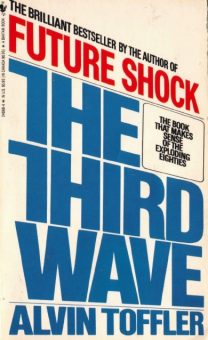A FRENZY OF NATIONS
Put simply, a Second Wave political unit was needed to match the growth of Second Wave economic units.
Not surprisingly, as Second Wave societies began to build national economies, a basic shift in public consciousness became evident. The small-scale local production in First Wave societies had bred a race of highly provincial people—most of whom concerned themselves exclusively with then: own neighborhoods or villages. Only a tiny handful—a few nobles and churchmen, a scattering of merchants and a social fringe of artists, scholars, and mercenaries—had interests beyond the village.
The Second Wave swiftly multiplied the number of people with a stake in the larger world. With steam- and coal-based technologies, and later with the advent of electricity, it became possible for a manufacturer of clothing in Frankfurt, watches in Geneva, or textiles in Manchester to produce far more units than the local market could absorb. He also needed raw materials from afar. The factory worker, too, was affected by financial events occurring thousands of miles away: jobs depended on distant markets.
Bit by bit, therefore, psychological horizons expanded. The new mass media increased the amount of information and imagery from far away. Under the impact of these changes, localism faded. National consciousness stirred.
Starting with the American and French revolutions and continuing through the nineteenth century, a frenzy of nationalism swept across the industrializing parts of the world. Germany’s three hundred and fifty petty, diverse, quarreling mini-states needed to be combined into a single national market—das Vaterland. Italy—broken into pieces and ruled variously by the House of Savoy, the Vatican, the Austrian Hapsburgs, and the Spanish Bourbons—had to be united. Hungarians, Serbs, Croats, Frenchmen, and others all suddenly developed mystical affinities for then* fellows. Poets exalted the national spirit. Historians discovered long-lost heroes, literature, and folklore. Composers wrote hymns to nationhood. All at precisely the moment when industrialization made it necessary.
Once we understand the industrial need for integration, the meaning of the national state becomes clear. Nations are not “spiritual unities” as Spengler termed them, or ‘*mental communities” or “social souls.” Nor is a nation “a rich heritage of memories,” to use Kenan’s phrase, or a “shared image of the future,” as Ortega insisted.
82
Pages: 1 2 3 4 5 6 7 8 9 10 11 12 13 14 15 16 17 18 19 20 21 22 23 24 25 26 27 28 29 30 31 32 33 34 35 36 37 38 39 40 41 42 43 44 45 46 47 48 49 50 51 52 53 54 55 56 57 58 59 60 61 62 63 64 65 66 67 68 69 70 71 72 73 74 75 76 77 78 79 80 81 82 83 84 85 86 87 88 89 90 91 92 93 94 95 96 97 98 99 100 101 102 103 104 105 106 107 108 109 110 111 112 113 114 115 116 117 118 119 120 121 122 123 124 125 126 127 128 129 130 131 132 133 134 135 136 137 138 139 140 141 142 143 144 145 146 147 148 149 150 151 152 153 154 155 156 157 158 159 160 161 162 163 164 165 166 167 168 169 170 171 172 173 174 175 176 177 178 179 180 181 182 183 184 185 186 187 188 189 190 191 192 193 194 195 196 197 198 199 200 201 202 203 204 205 206 207 208 209 210 211 212 213 214 215 216 217 218 219 220 221 222 223 224 225 226 227 228 229 230 231 232 233 234 235 236 237 238 239 240 241 242 243 244 245 246 247 248 249 250 251 252 253 254 255 256 257 258 259 260 261 262 263 264 265 266 267 268 269 270 271 272 273 274 275 276 277 278 279 280 281 282 283 284 285 286 287 288 289 290 291 292 293 294 295 296 297 298 299 300 301 302 303 304 305 306 307 308 309 310 311 312 313 314 315 316 317 318 319 320 321 322 323 324 325 326 327 328 329 330 331 332 333 334 335 336 337 338 339 340 341 342 343 344 345 346 347 348 349 350 351 352 353 354 355 356 357 358 359 360 361 362 363 364 365 366 367 368 369 370 371 372 373 374 375 376 377 378 379 380 381 382 383 384 385 386 387 388 389 390 391 392 393 394 395 396 397 398 399 400 401 402 403 404 405 406 407 408 409 410 411 412 413 414 415 416 417 418 419 420 421 422 423 424 425 426 427 428 429 430




